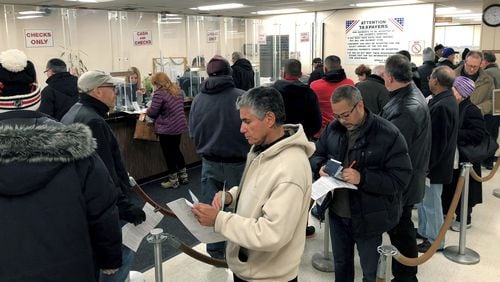It’s not often that people are excited — let alone eager — to pay their taxes.
But across metro Atlanta, cities and counties are fielding calls from residents who just can’t wait to hand over their money.
Why the rush to pay? In short, it's the result of the new tax reform passed by Congress.
The Republican-sponsored law eliminates some deductions, and puts a $10,000 cap on the combined itemized deduction for state, local and property taxes. Residents who typically deduct more than $10,000 are among those trying to pay their property taxes early, to take advantage of the existing law, before the new one kicks in.
In a statement Wednesday afternoon, the Internal Revenue Service said early payments for 2018 property taxes can be deducted — but only if those property taxes are assessed this year. In Georgia, no 2018 property taxes are assessed in 2017.
Even before the IRS’ clarification on deductions, Georgia property owners would be mostly unable to pre-pay. Local tax commissioners say state law prohibits them from accepting property tax payments early, before bills go out, though at least one city insists that it’s OK and has been collecting for 2018.
William Gaston, a spokesman for the state Department of Revenue, didn’t weigh in, deferring to the cities and the county tax commissioners to answer questions about property tax collections.
“You’re not going to find any tax commissioner willing to take in that money,” said Kevin Payne, the Floyd County tax commissioner and president of the Georgia Association of Tax Officials. “It’s pretty settled law for county tax commissioners.”
Milton officials see things differently, though. In Milton, residents who are willing to go to city hall with a check can make 2018 property tax payments before the end of the year, said Shannon Ferguson, a spokesperson for the city.
“There were enough questions that it motivated us to be accommodating to our residents,” she said.
Across metro Atlanta, residents whose homes are worth less than $600,000 generally won’t have to worry about the change in allowed deductions. But that depends on local tax rates, which vary, and which haven’t been set for 2018.
Changes to the property, state and local tax deductions created some of the biggest internal fault lines for congressional Republicans as they negotiated the tax bill this fall.
Republicans from states with high income and property taxes such as New York, New Jersey and California worried their constituents could be hit the hardest.
The Senate proposed eliminating state and local deductions, also known as SALT, entirely, while the House bill kept the property tax write-offs for up to $10,000 while ending previously unlimited exemptions for state and local income and sales tax.
After some GOP lawmakers threatened rebellion, both proposals were pared down in the final tax bill. The measure President Donald Trump ultimately signed into law allows individuals and married couples to deduct up to $10,000 of income or sales tax, plus property tax.
The pending changes to the tax code have led to a frenzy of people seeking ways to save before the deductions disappear.
Julie Brechbill, a spokesperson for Roswell, said that city has gotten more than 100 requests from people who want to pay early. Calls have picked up in Forsyth, Cobb, Gwinnett and Fulton counties, as well. In Fayette and DeKalb counties, because of the number of requests to pay before the end of the year, tax commissioners have put notes on their websites telling people they cannot accept property tax money for 2018.
In Georgia, tax commissioners can’t accept 2018 payments before they have set their tax rate and gotten their digest approved by the state tax commissioner. Many county tax commissioners also collect for local cities.
“The average citizen doesn’t understand,” Henry County Tax Commissioner David Curry said. “They look at it as if were a water bill or a power bill or a credit card statement. ‘I know I only owe $100 but I’m going to pay $500 and you can just draw down off that.’”
Curry said he started getting request to pay early a couple of weeks ago. He estimates about 75 Henry residents have sought to get a jump on their property tax payments since mid-December when it became apparent the tax bill was likely to pass.
“I don’t blame them,” he said. “If I had a tax bill of $10,000 or more, I’d be wanting to get that tax exemption as well.”
Garry Siegel, who moved from East Cobb to Roswell earlier this year, was one of those who tried to pay early. He said he’d hoped to take the same deduction this year for his 2018 property taxes that he had in the past. While he doesn’t yet know what his Fulton County taxes will look like, Siegel said he paid more than $20,000 in state taxes and local property taxes in both 2015 and 2016. With a $10,000 limit, Siegel said, he’s “going to be over it, for sure.”
“If I could’ve paid my property taxes and saved money, I sure would’ve done it,” he said.
Carla Jackson, the Cobb County tax commissioner, said tax commissioners could be subject to double penalties for even attempting to collect taxes before the proper process can be completed. She estimated she’s fielded as many as 70 inquiries from people who want to pay early, but the answer is the same.
“In Georgia, unfortunately, we cannot accept 2018 tax payments yet,” Jackson said
Still, some tax preparers are encouraging their clients to try. Infinity Tax and Accounting Services, in Lawrenceville, posted a note on Facebook Wednesday encouraging people to pay early “so you can deduct this prepaid property tax in 2017.” No one from the company returned a phone call seeking comment about the post.
Curry, in Henry County, said advice like that is “wrong.”
“What’s happening here is we have some bad information being given to consumers from financial advisers,” he said.
So what about Milton? Ferguson, the city spokesperson, said the city attorney made sure Milton was in the clear. Other cities, from Decatur to Marietta, said they aren't taking pre-payments. But Amy Henderson, a spokesperson for the Georgia Municipal Association, said the law only prohibits billing. Milton may be OK.
“We are not billing nor have we sent future tax bills without an assessment,” Ferguson said. “We are accepting payments. Our communications to residents have been clear that these are pre-payments and will go towards the next billed tax amount owed to the city.”
Residents are taking advantage of it. At the end of the day Wednesday, 28 people had paid early, including some who paid double what they owed for 2017, Ferguson said. But their efforts may have been in vain. Since 2018 taxes haven’t yet been assessed in the city, the IRS said they can’t be deducted this year.
Staff writers Leon Stafford, Tia Mitchell, Meris Lutz, Tyler Estep, John Perry and Tamar Hallerman contributed to this story.




/cloudfront-us-east-1.images.arcpublishing.com/ajc/P7DYBH6TO7FEKG4SUXQQKADRXE.jpg)



